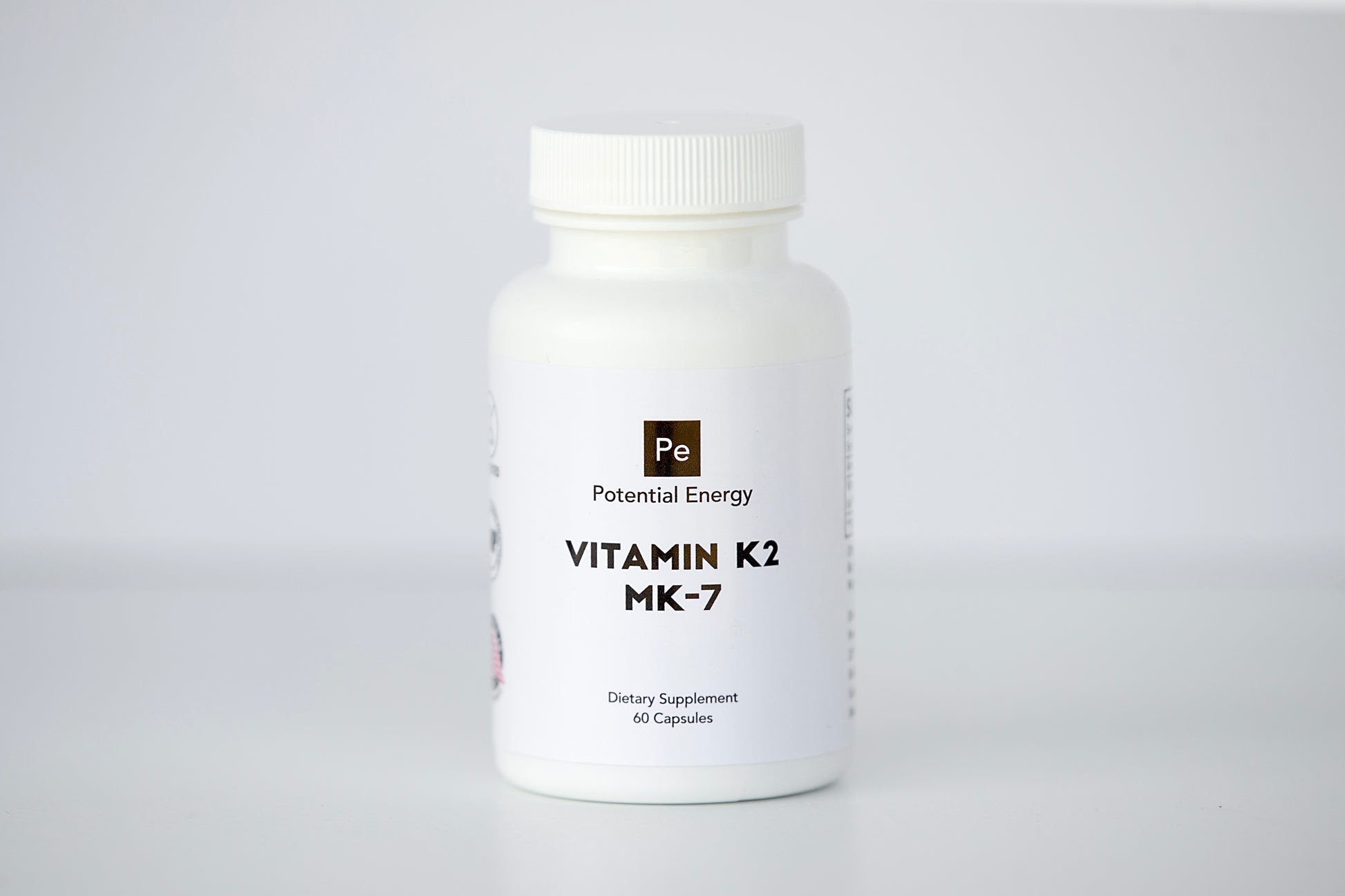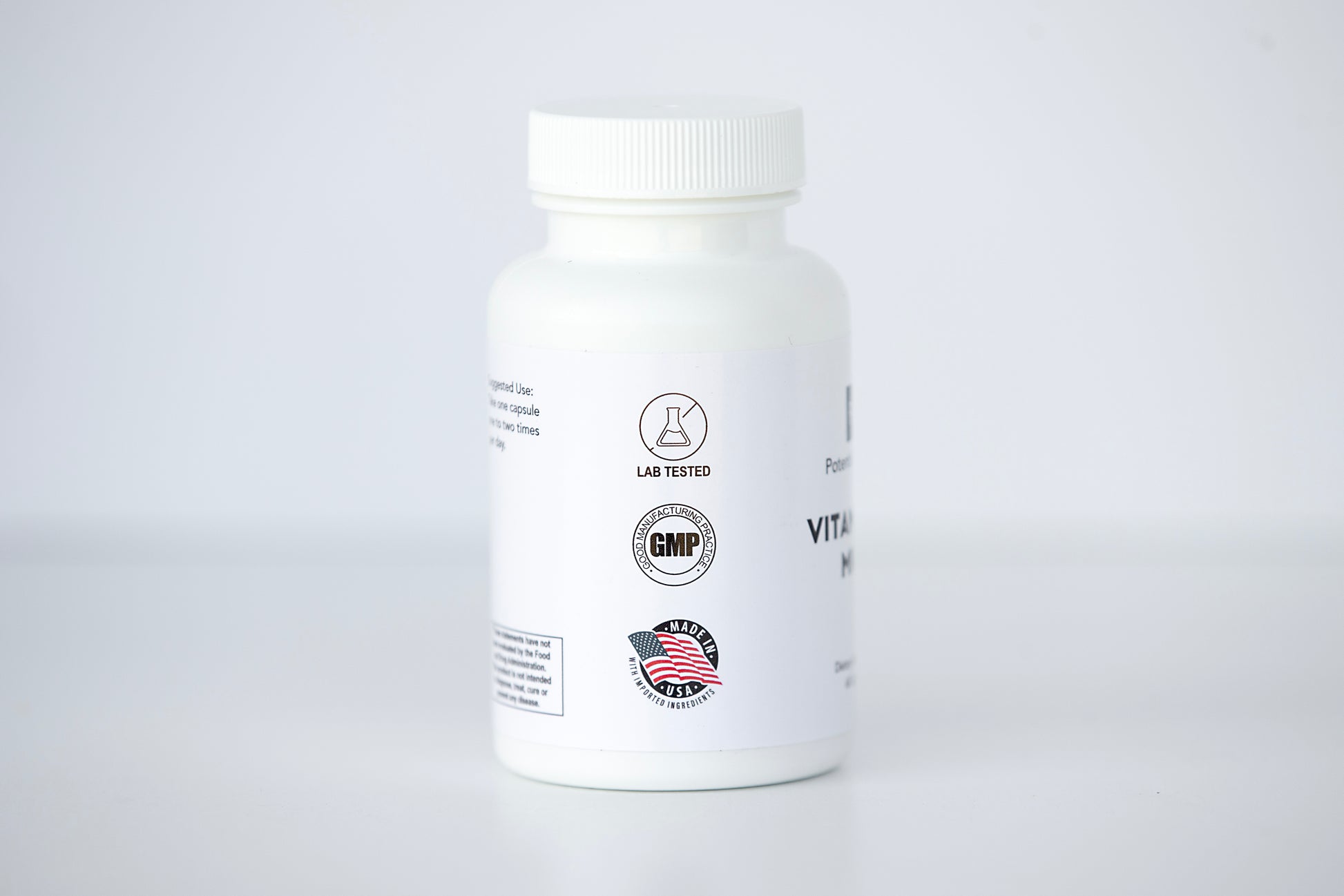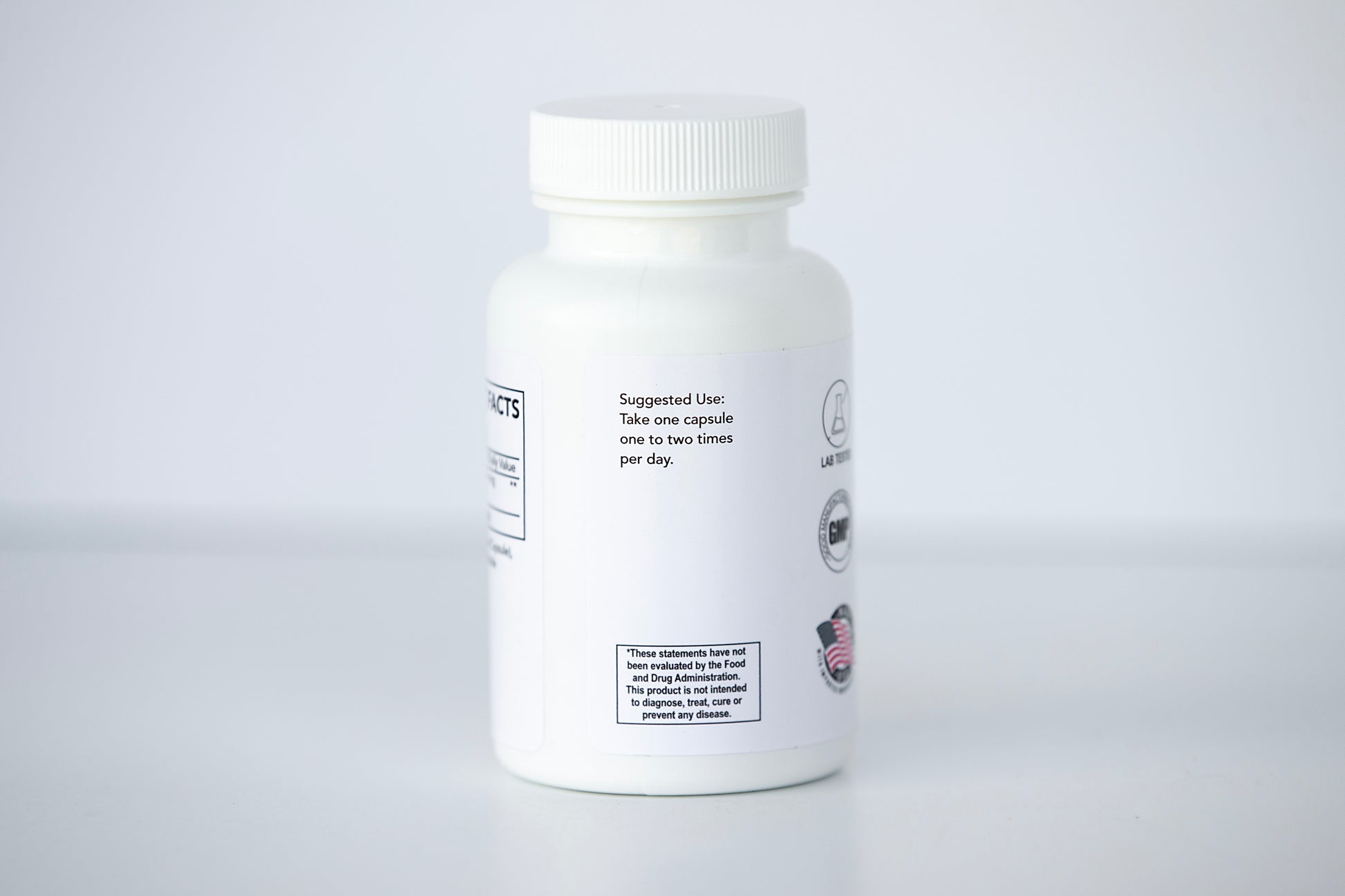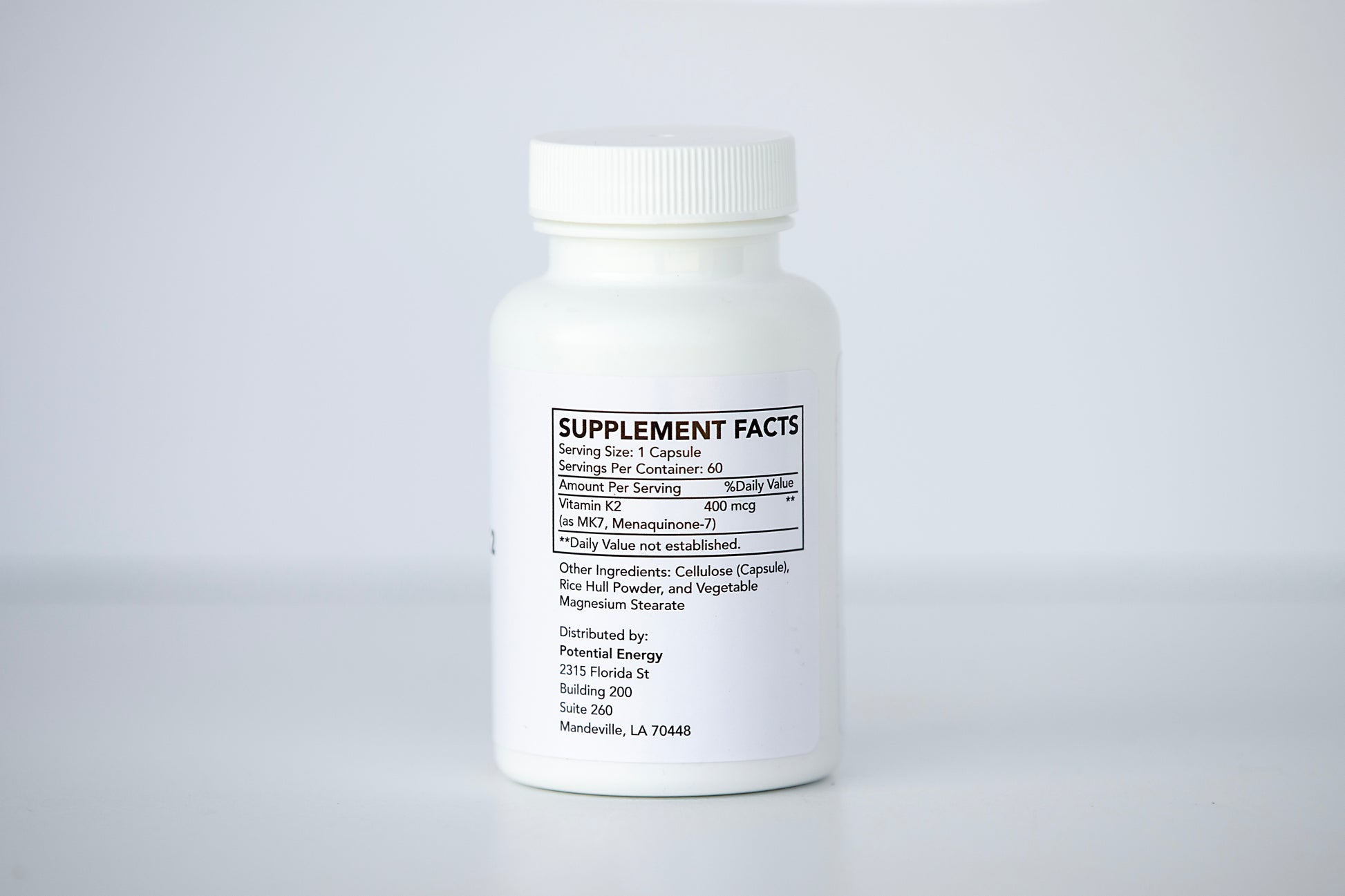Vitamin K2 MK-7
Vitamin K2 MK-7
Couldn't load pickup availability
This natural powerhouse is your secret to:
- Strong Bones: Support bone health and ensure calcium goes where it should.
-Teeth Health: Activator X for tooth enamel, cavity prevention, and gum health.
-Healthy Heart: Keep your cardiovascular system in top shape.
-Energy: Say goodbye to fatigue and welcome lasting energy.
Supplement Facts:
Servings per container: 60
Serving size: 1 capsule
Each capsule contains:
Vitamin K2 (as MK7, Menaquinone-7) 400 mcg
Other ingredients: cellulose (capsule), rice hull powder, and vegetable magnesium stearate
Share
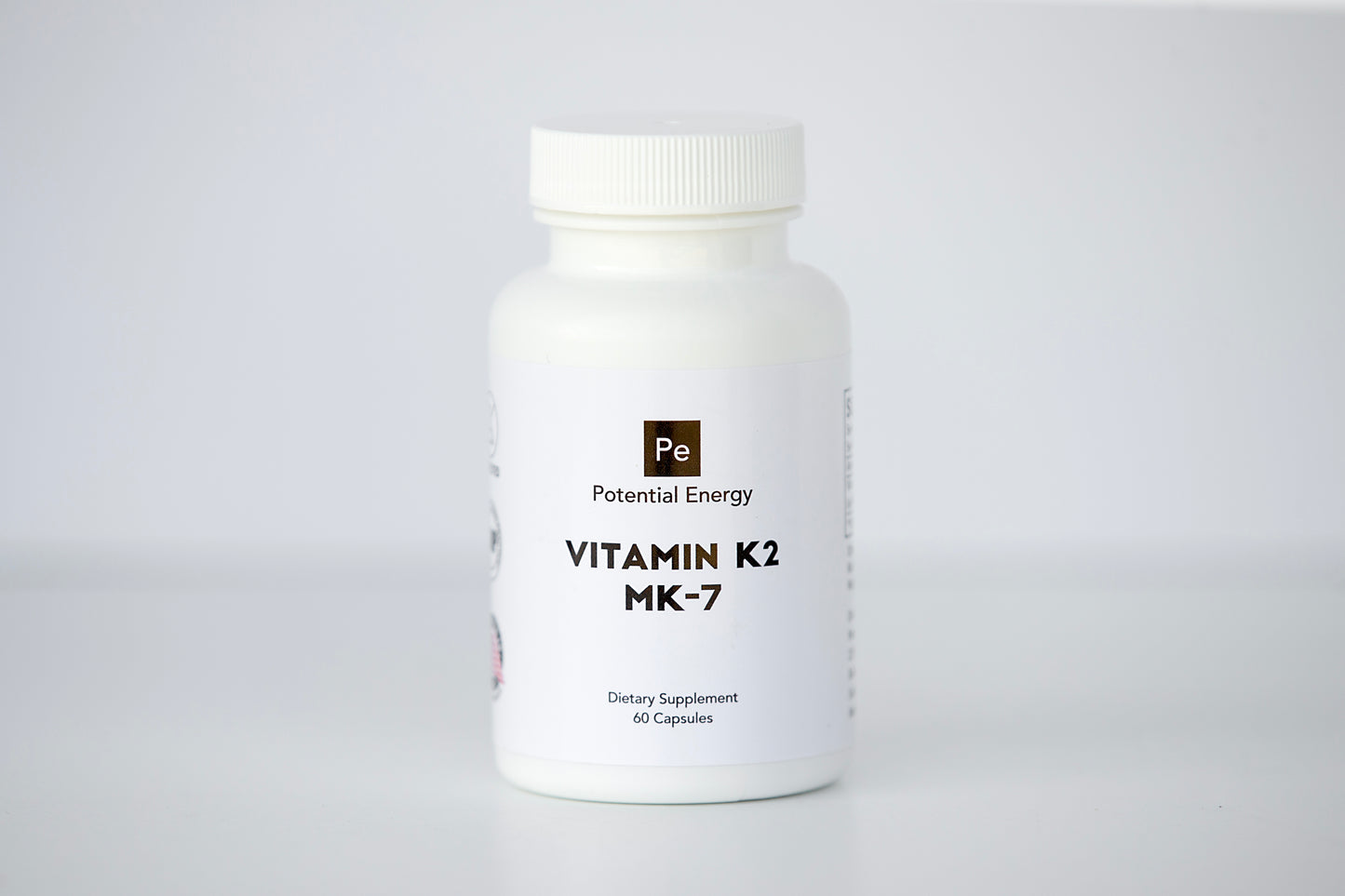
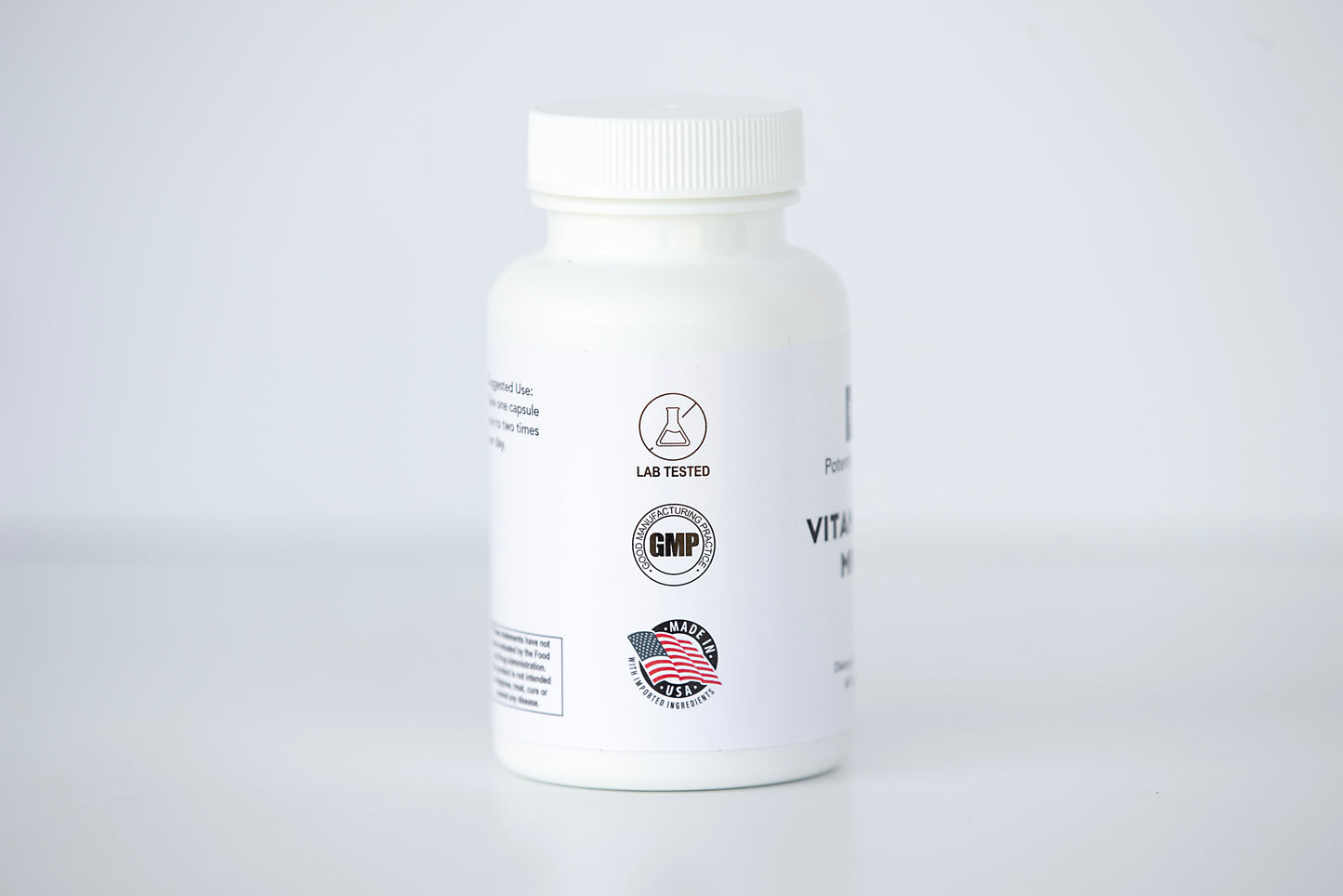
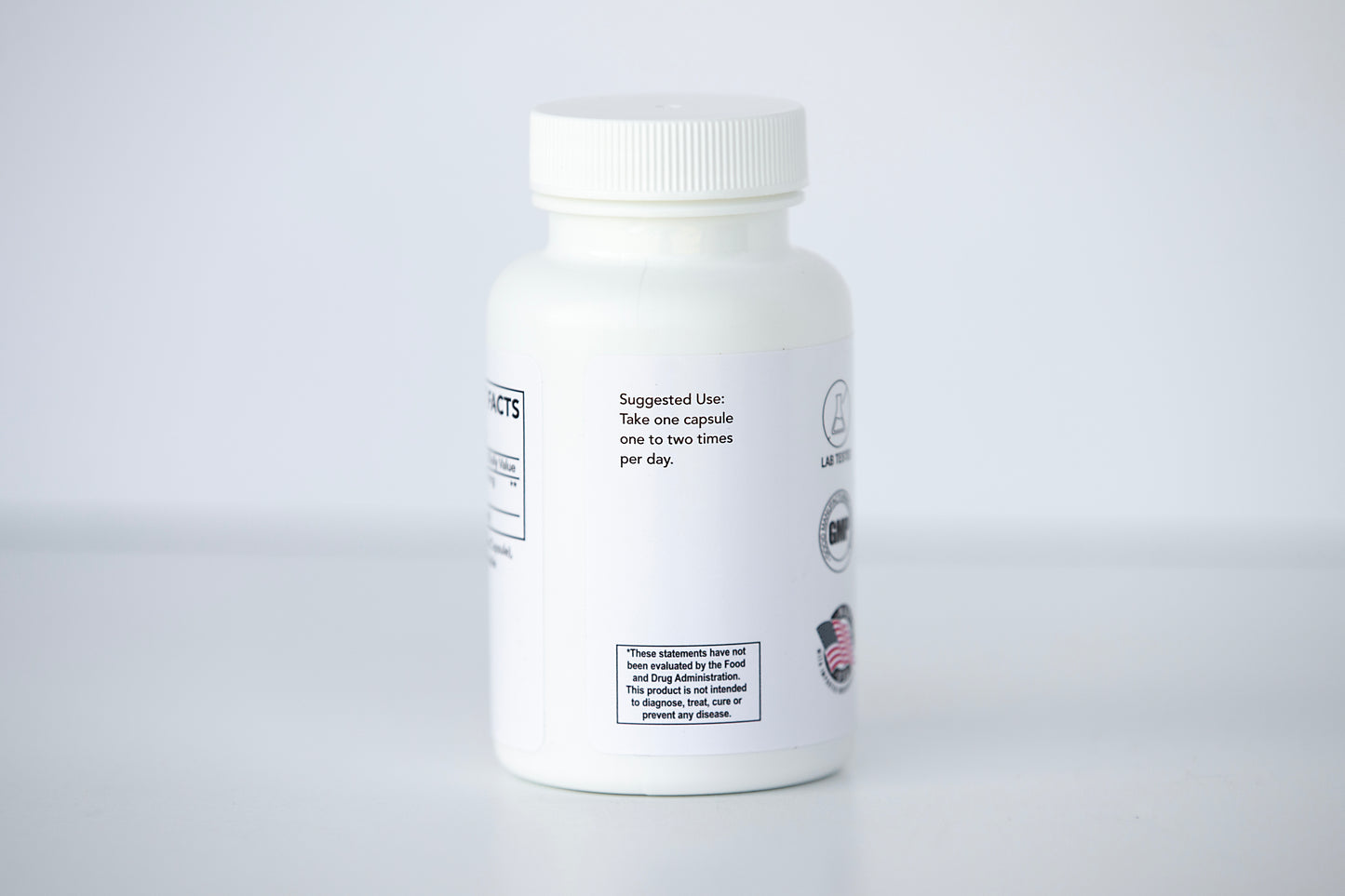
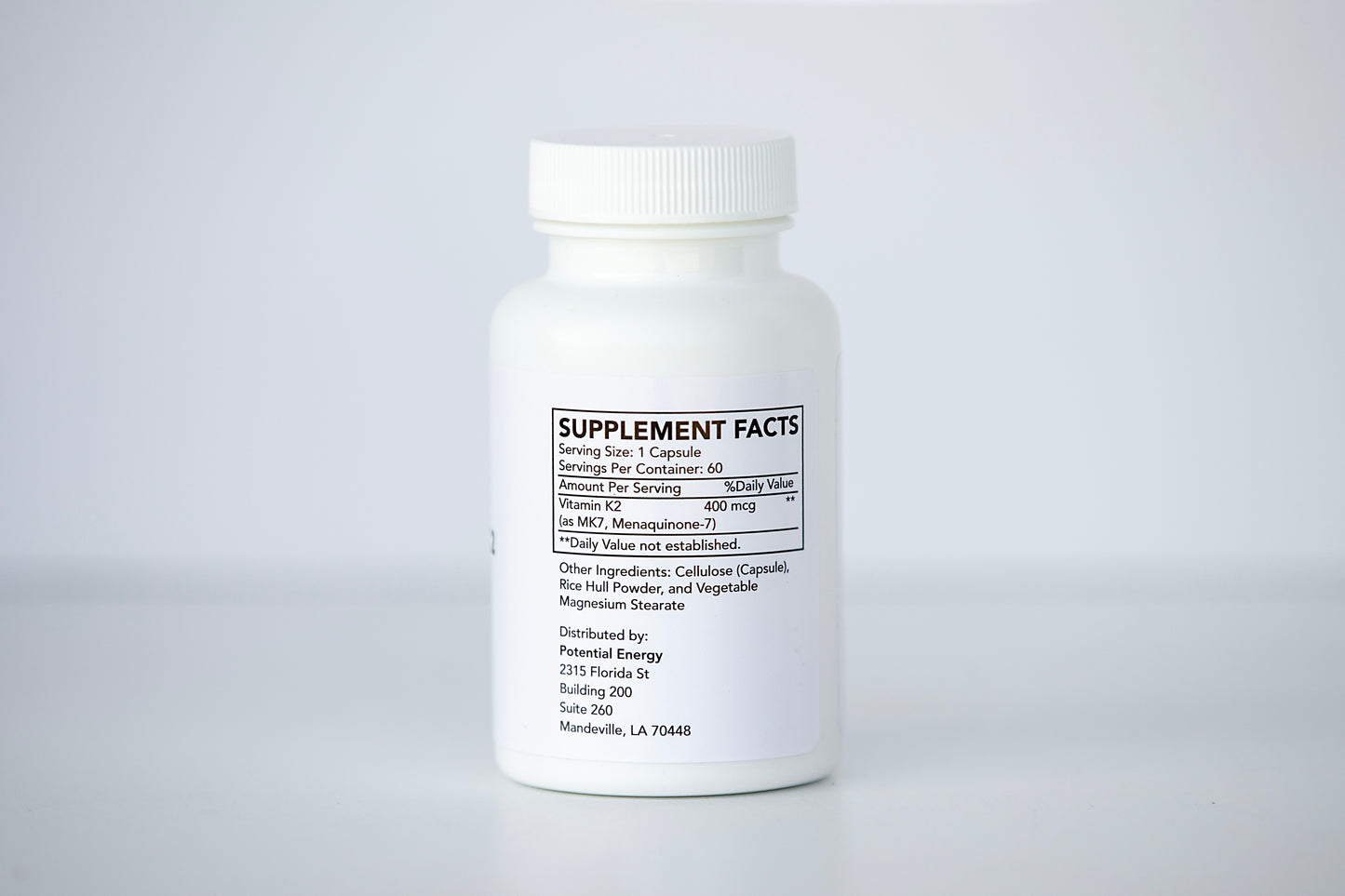
Vitamin K Research/References
US Pharmacopeial Convention safety evaluation of menaquinone-7, a form of vitamin K
Marles RJ, Roe AL, Oketch-Rabah HA. US Pharmacopeial Convention safety evaluation of menaquinone-7, a form of vitamin K. Nutr Rev. 2017 Jul 1;75(7):553-578. doi: 10.1093/nutrit/nux022. PMID: 28838081.
This information discusses vitamin K, specifically a form called menaquinone-7 (MK-7). Vitamin K is important for blood clotting, bone health, and other bodily functions. MK-7 is a type of vitamin K2 found in some foods and supplements. It has good bioavailability, meaning the body can absorb it effectively. This review looks at the chemistry, dietary sources, intake levels, and safety of MK-7. Based on the available data, MK-7 supplements are considered safe and do not pose serious health risks. Quality standards for MK-7 supplements have been established to ensure their safety and effectiveness.
Safety and toxicological evaluation of a synthetic vitamin K2, menaquinone-7
Pucaj K, Rasmussen H, Møller M, Preston T. Safety and toxicological evaluation of a synthetic vitamin K2, menaquinone-7. Toxicol Mech Methods. 2011 Sep;21(7):520-32. doi: 10.3109/15376516.2011.568983. Epub 2011 Jul 25. PMID: 21781006; PMCID: PMC3172146.
This study aimed to assess the potential toxicity of synthetic Menaquinone-7 (MK-7), a form of vitamin K2, in mice and rats. In an acute oral toxicity test on mice, a high dose of 2000 mg/kg body weight was administered, and no toxicity was observed during a 14-day observation period. In a subchronic oral toxicity test on rats, MK-7 was given daily for 90 days at doses of 2.5, 5, and 10 mg/kg body weight. The study found no toxicity related to MK-7 in rats based on various measures, including clinical observations, pathology, and histopathology. The highest dose of 10 mg/kg body weight showed no adverse effects. Therefore, the study concluded that MK-7 has a low risk of toxicity, with no observed adverse effects during the tests.
Does vitamin K2 play a role in the prevention and treatment of osteoporosis for postmenopausal women: a meta-analysis of randomized controlled trials
Huang, Z., Wan, S., Lu, Y., Ning, L., Liu, C., & Fan, S. (2015). Does vitamin K2 play a role in the prevention and treatment of osteoporosis for postmenopausal women: a meta-analysis of randomized controlled trials. Osteoporosis International, 26, 1175-1186. https://doi.org/10.1007/s00198-014-2989-6.
This meta-analysis examined the role of vitamin K2 in preventing and treating osteoporosis in postmenopausal women by analyzing 19 randomized controlled trials. The results indicated that vitamin K2 may help maintain bone mineral density (BMD) and reduce fracture incidence in postmenopausal women with osteoporosis.
Specific findings:
Postmenopausal women with osteoporosis who took vitamin K2 showed a significant improvement in vertebral BMD, both in the medium-term and long-term results.
When analyzing fracture incidence, initially, no significant difference was found favoring vitamin K2. However, after a sensitivity analysis that excluded studies causing heterogeneity, a significant reduction in fracture incidence was observed with vitamin K2.
The meta-analysis also revealed significant changes in undercarboxylated osteocalcin and total osteocalcin levels, indicating a possible link to the bone mineralization process.
In conclusion, this meta-analysis supports the idea that vitamin K2 may play a role in maintaining and improving vertebral BMD and preventing fractures in postmenopausal women with osteoporosis. However, its effects in postmenopausal women without osteoporosis require further research through high-quality randomized controlled trials with larger sample sizes.
Vitamin K2 improves bone strength in postmenopausal women
Schurgers, L.J., Knapen, M.H.J., Vermeer, C. (2007). Vitamin K2 improves bone strength in postmenopausal women. International Congress Series, 1297, 179-187. ISSN 0531-5131. ISBN 9780444528872. https://doi.org/10.1016/j.ics.2006.08.006.
High vitamin K intake is associated with improved bone health and a reduced risk of osteoporotic fractures. Both vitamins K1 and K2, when taken at normal nutritional levels, can help improve bone mineral density. Studies also suggest that there is a synergistic effect when vitamin K is combined with vitamin D and calcium, making bone health even better.
At higher intake levels, vitamin K has been shown to enhance bone strength by improving bone geometry, but this effect is specifically associated with vitamin K2. In this study, it was found that the side chain in vitamin K2 could be considered a geranylgeranyl derivative, which inhibits the activation of osteoclasts – cells that break down bone. This inhibition is likely due to the interference with the mevalonate pathway.
While menaquinone-4 (MK-4) might seem like the obvious choice for vitamin K2 supplementation at higher doses, there are arguments suggesting that menaquinone-7 (MK-7) could be more effective.
Vitamin K, vertebral fractures, vascular calcifications, and mortality: VItamin K Italian (VIKI) dialysis study
Fusaro M, Noale M, Viola V, Galli F, Tripepi G, Vajente N, Plebani M, Zaninotto M, Guglielmi G, Miotto D, Dalle Carbonare L, D'Angelo A, Naso A, Grimaldi C, Miozzo D, Giannini S, Gallieni M; VItamin K Italian (VIKI) Dialysis Study Investigators. Vitamin K, vertebral fractures, vascular calcifications, and mortality: VItamin K Italian (VIKI) dialysis study. J Bone Miner Res. 2012 Nov;27(11):2271-8. doi: 10.1002/jbmr.1677. PMID: 22692665.
Vitamin K is essential for making proteins in our bones and blood vessels that help control calcium. When we don't have enough vitamin K, it can lead to problems like fractures in our bones and calcium buildup in our blood vessels. In this study, researchers looked at 387 patients on hemodialysis (a treatment for kidney problems) for over a year.
They found that many of these patients had low levels of different forms of vitamin K (MK7, vitamin K1, and MK4). A significant number of patients had fractures in their spine, calcification (calcium buildup) in their abdominal aorta (a large blood vessel), and calcification in their iliac (pelvic) area.
They also discovered that vitamin K1 deficiency was linked to spine fractures, MK4 deficiency was linked to aortic calcification, and MK7 deficiency was linked to calcification. Having spine fractures was also linked to vascular calcifications.
The study suggests that vitamin K plays a crucial role in maintaining bone health and preventing calcium buildup in blood vessels among patients on hemodialysis. These findings raise the possibility that vitamin K deficiency might contribute to fractures and vascular problems, not just in these patients but also in the general population.
Vitamin K and the prevention of fractures: systematic review and meta-analysis of randomized controlled trials
Cockayne S, Adamson J, Lanham-New S, Shearer MJ, Gilbody S, Torgerson DJ. Vitamin K and the prevention of fractures: systematic review and meta-analysis of randomized controlled trials. Arch Intern Med. 2006 Jun 26;166(12):1256-61. doi: 10.1001/archinte.166.12.1256. Erratum in: JAMA Intern Med. 2018 Jun 1;178(6):875-876. PMID: 16801507.
This study aimed to find out if taking vitamin K supplements, specifically phytonadione and menaquinone, can help prevent bone loss and fractures. They reviewed various research studies to gather data.
The results showed that most of the studies found that phytonadione and menaquinone were beneficial in reducing bone loss. When they looked at data specifically related to fractures, they found that Japanese studies using menaquinone showed a significant advantage. For vertebral fractures, the odds ratio (a measure of the effect) was 0.40, for hip fractures, it was 0.23, and for all nonvertebral fractures, it was 0.19. These numbers suggest that taking menaquinone can significantly reduce the risk of fractures.
In conclusion, this systematic review indicates that taking phytonadione and menaquinone supplements can help reduce bone loss, especially menaquinone, which has a strong effect in preventing fractures, particularly in Japanese patients.
Low-Dose Daily Intake of Vitamin K(2) (Menaquinone-7) Improves Osteocalcin γ-Carboxylation: A Double-Blind, Randomized Controlled Trials.
Inaba, N., Sato, T., & Yamashita, T. (2015). Low-Dose Daily Intake of Vitamin K(2) (Menaquinone-7) Improves Osteocalcin γ-Carboxylation: A Double-Blind, Randomized Controlled Trials.. Journal of nutritional science and vitaminology, 61 6, 471-80. https://doi.org/10.3177/jnsv.61.471.
The study looked at how a type of vitamin K called menaquinone-7 (MK-7) affects bone health in Japanese people, especially women who have gone through menopause. They did two studies:
In the first study, they had 60 postmenopausal women try different amounts of MK-7 for 4 weeks. They found that when they didn't take any MK-7 (0 μg), it didn't help with bone health. But when they took 100 μg or 200 μg of MK-7, it made a difference in improving bone health.
In the second study with 120 people, they saw that taking 100 μg of MK-7 for 12 weeks also improved bone health compared to those who didn't take it. So, it seems like taking at least 100 μg of MK-7 daily might be good for bone health, especially for women in Japan.
Vitamin K: Double Bonds beyond Coagulation Insights into Differences between Vitamin K1 and K2 in Health and Disease
Halder M, Petsophonsakul P, Akbulut AC, Pavlic A, Bohan F, Anderson E, Maresz K, Kramann R, Schurgers L. Vitamin K: Double Bonds beyond Coagulation Insights into Differences between Vitamin K1 and K2 in Health and Disease. Int J Mol Sci. 2019 Feb 19;20(4):896. doi: 10.3390/ijms20040896. PMID: 30791399; PMCID: PMC6413124.
Vitamin K is a crucial nutrient essential for our health, and it comes in different forms known as isoforms, mainly vitamin K1 and K2. These isoforms have structural differences that affect how they are absorbed, distributed in our body, and used. Both K1 and K2 work as cofactors for an enzyme called gamma-glutamylcarboxylase, which plays a role in processes like blood clotting. However, only carboxylated proteins activated by vitamin K are beneficial.
Vitamin K2, specifically in the form of MK-7, has been found to have extra health benefits such as helping with osteoporosis (bone loss), atherosclerosis (hardening of arteries), cancer, and inflammatory diseases. The key advantage of K2 is that it offers these benefits without causing negative side effects or the risk of overdosing.
High dietary menaquinone intake is associated with reduced coronary calcification.
Beulens, J., Bots, M., Atsma, F., Bartelink, M., Prokop, M., Geleijnse, J., Witteman, J., Grobbee, D., & Schouw, Y. (2009). High dietary menaquinone intake is associated with reduced coronary calcification.. Atherosclerosis, 203 2, 489-93. https://doi.org/10.1016/j.atherosclerosis.2008.07.010.
This study examined the relationship between dietary intake of two types of vitamin K (phylloquinone and menaquinone) and coronary calcification in post-menopausal women. They found that phylloquinone intake was not associated with coronary calcification, but menaquinone intake was associated with a reduced risk of coronary calcification. In other words, women who consumed more menaquinone had a lower likelihood of developing coronary calcification, which is linked to cardiovascular disease. This suggests that having an adequate intake of menaquinone may be important for preventing heart-related issues.
Vitamin K2—a neglected player in cardiovascular health: a narrative review
Hariri, E., Kassis, N., Iskandar, J., Schurgers, L., Saad, A., Abdelfattah, O., Bansal, A., Isogai, T., Harb, S., & Kapadia, S. (2021). Vitamin K2—a neglected player in cardiovascular health: a narrative review. Open Heart, 8. https://doi.org/10.1136/openhrt-2021-001715.
Vitamin K2 plays a crucial role in heart health by helping to regulate calcium levels in the body. It does this by activating a protective protein called matrix Gla protein. When this protein is inactive, it's linked to various cardiovascular problems like stiff arteries, calcium buildup in blood vessels and heart valves, insulin resistance, and indicators of heart failure, all of which can increase the risk of heart-related deaths.
Supplementing with vitamin K2 has been strongly associated with better cardiovascular health by reducing systemic calcification and arterial stiffness. Although ongoing research is investigating its direct impact on preventing calcium buildup in blood vessels and heart valves, previous studies have suggested that vitamin K2 supplementation could improve survival rates in people with heart issues. This vitamin is affordable and considered safe.
Vitamin K2 and its Impact on Tooth Epigenetics
Jan Oxholm Gordeladze, Maria A. Landin, Gaute Floer Johnsen, Håvard Jostein Haugen and Harald Osmundsen Submitted: December 28th 2015 Reviewed: December 5th 2016 Published: March 22nd 2017
This information explores the role of nutritional signals and vitamin K2 in dental health, specifically in the context of dental caries (tooth decay). It suggests that the impact of diet and nutrients can affect tooth health beyond just oral hygiene. The tooth is influenced by forces, nourishment, and cleansing, and its support system involves communication between the hypothalamus (a part of the brain) and the parotid gland. Sugar consumption is linked to oxidative stress in the hypothalamus, which can disrupt the flow of dentinal fluid, making teeth more vulnerable to oral bacteria.
Oral bacteria produce acid, leading to dentine erosion and loss of dental enamel layers, causing inflammation and tooth decay. However, vitamin K2, such as MK-4 or MK-7, may help by acting as an antioxidant. It can do this either locally in the mouth or systemically through the brain. By reducing oxidative stress, vitamin K2 supports hormone-induced dentinal fluid flow and enhances the body's inflammatory responses to dental issues.
On the other hand, excessive sugar intake can weaken the tooth's natural defenses through endocrine signaling, making acid-induced enamel dentine erosion worse. Vitamin K2 also contributes to saliva's ability to neutralize acids, thus promoting dental health.
The Impact of Vitamin K2 (Menaquionones) in Children’s Health and Diseases: A Review of the Literature
Kozioł-Kozakowska, A., & Maresz, K. (2022). The Impact of
Vitamin K2 (Menaquionones) in Children’s Health and Diseases: A Review
of the Literature. Children, 9. https://doi.org/10.3390/children9010078.
Vitamin K2 is essential for activating proteins in our bodies that help with various important functions like building strong bones, keeping blood vessels flexible, supporting heart health, maintaining healthy teeth, aiding in brain development, and more. Unfortunately, changes in eating habits over the last 50 years have led to lower intake of vitamin K, especially K2, among parents and their children. This decrease can have serious health consequences.
Certain medications given to kids, like antibiotics and glucocorticoids, can also contribute to low vitamin K levels. A study suggested that better vitamin K levels are linked to fewer low-energy fractures.
There's an ongoing study to see if vitamin K2 and D3 supplements can positively impact bone healing. Vitamin K2, specifically as menaquinone-7 (MK-7), has a proven history of safe and effective use. It's considered a good choice for pregnant and nursing women, as well as children with various health issues.

